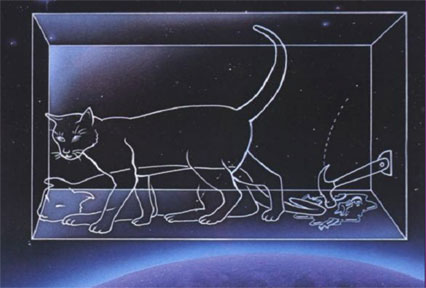

|
All things He hesitated, then with that level, impersonal voice we reserve for confiding something intimate, he said that to finish the poem he could not get along without the house because down in the cellar there was an Aleph. He explained that an Aleph is one of the points in space that contains all other points. “It’s in the cellar under the dining room,” he went on, so overcome
by his worries now that he forgot to be pompous. |
1 July 2011
|
||
|
Worth the trouble... We can only be said to be alive in those moments when our hearts are conscious of our treasures. — Thornton Wilder |
2 July 2011
|
||
|
Sometimes an anomaly is only an anomaly Einstein said the most surprising thing about the world is that it is regular and amenable to generalization. Why do kids love repetition. They’ll play the same game over and over, listen to the same CD track hundreds of times, watch the same movie until it drives the parents to distraction? Perhaps they are absorbing Einstein’s message, trying to figure out the limits of the rules of induction – how can they know when the same action will produce the same result? Perhaps as adults we have over-generalized this message. Certainly science has made great strides, based on cataloguing and understanding that which is repeatable under laboratory conditions. But that doesn’t mean that all anomalies are mistakes. It’s logically possible that there are phenomena that are not repeatable: do the same experiment twice, and you are apt to get different results. In quantum mechanics this is accepted as true axiomatically. In biology, it is true because no two biological systems are identical. But what of the one-of-a-kind events that we hear about but don’t believe because they’re just too strange? Maybe biology holds surprises we have yet to acknowledge. —Josh Mitteldorf |
3 July 2011
|
||
|
The Esquimos have no word for war Trying to explain it to them With spears and sleds and barking dogs Later, by fires and boiling bones —Mary Oliver |
4 July 2011
|
||
|
Gratitude dance This is the story of a small boat, and the people on it, who ventured out into the water with snorkel, mask and small knives to cut a whale free from the gill net in which it had become ensnared and unable to swim. It points up how much the whale was able to understand – to remain still when he was in pain, and any small movement could have capsized the small boat. The whale’s deliberation in protecting and then thanking his liberators becomes clear at the end, when the whale moves off a safe distance and then performs a spectacular dance, celebrating his freedom and thanking his benefactors. Video |
5 July 2011
|
||
|
Productive procrastination Anyone can do any amount of work, provided it isn't the work he is supposed to be doing at that moment. |
6 July 2011
|
||
|
Mahler Today is the birthday of Gustav Mahler (1860). So much of his music is brooding pensive. My challenge is to find an example of Mahler that’s lively and fun. This is the ending of his Symphony #7, the last part of the Finale. There are several different styles even in this 8 minutes, but romping, stomping and jubilant predominate. In the video, Leonard Bernstein is having a great time, and pulls us right along. |
7 July 2011
|
||
|
No clear reason I dreamt last night — Robert Creeley (1926-2005) |
8 July 2011
|
||
|
Surprises in cosmology The galaxy at the right is rotating clockwise. We know this from an understanding of the spiral structure and its relationship to orbital motions. If the universe itself is not rotating, then you’d expect to see an equal number of clockwise and counter-clockwise galaxies, wherever you looked in the sky. For more than 90 years (since Einstein gave us the basis for understanding the large-scale dynamics of the universe), everyone has just assumed that the universe isn’t rotating. All the standard theories, including the Big Bang and many more, are based on the assumption that the universe is not rotating. Has anyone ever looked? Not until this year. Michael Longo of UMich Astonomy Dept examined a large number of galaxies in the northern hemisphere and found that 53% of them are rotating clockwise. In the southern hemisphere, 53% are rotating counter-clockwise. To me, the remarkable thing about this study is how simple it is. It required a few hundred hours of undergraduate labor, looking at pictures of galaxies and coding them R or L. It could have been done 50 years ago. Current versions of the Big Bang theory are already stressed by the need to include ‘Dark Matter’ and ‘Dark Energy’ — mysterious substances unknown to man except in the context of cosmology — in order to reconcile the amount of helium in the universe and the speed of expansion. If this new observation pans out, the Big Bang will be a candidate for open heart surgery.
PhysOrg article |
9 July 2011
|
||
|
Fear of death is not about death. It’s about fear. — Josh Mitteldorf |
10 July 2011
|
||
|
Listen to Trinita Sinfonica of Yasushi Akutagawa, born this day in 1925. (Takuo Yuasa conducts the New Zealand Symphony Orchestra) |
11 July 2011
|
||
|
|
12 July 2011
|
||
|
3D Printing There are several companies that offer competing technologies for replicating a 3D object in plastic, at a cost of a few dollars, within a few hours for the whole process. Accuracy is less than the width of a human hair. Moving parts and color are options. Youtube video |
13 July 2011
|
||
|
Bastille It was the best of times, |
14 July 2011
|
||
|
Understanding fear When a deer in the meadow notices you approaching, it instantly stops grazing and looks at you motionlessly. The white tail, used to signal danger to other deer, twitches slightly now and then, ready to flash at any time. If you come too close or move too abruptly, up goes the tail like a torch and the animal bounds gracefully into the woods for cover. For us humans no presence of genuine physical dnager is needed for the whole body to be flooded by waves of anxiety. All it takes is one scary thought, one fearful memory, one threatening image to trigger physical light or fight or freeze reactions. Imagining we are alone and isolated, abandoned, causes immediate pain and sorrow. Deer most likely don’t ruminate about being separate creatures – it spares them a lifetime of mental grief! — Toni Packer, from Being Bodies - Buddhist women on the paradox of embodiment. |
15 July 2011
|
||
|
Free From this hour I ordain myself loos’d of limits and imaginary lines. Going where I list, my own master, total and absolute. Listening to others, and considering well what they say. Pausing, searching, receiving, contemplating. Gently but with undeniable will, divesting myself of the holds that would hold me. —Walt Whitman |
16 July 2011
|
||
|
To look on our world from a vantage of humility, mystery, and wonder Remember how smug were the intellectuals of the European Enlightenment. They were proud to have discovered a rational framework for dispelling superstition and agreeing on scientific truth. But these people knew nothing of atoms or galaxies or evolution, let alone quantum mechanics. They could not have conceived the changes in our circumstances that would be wrought by jet travel or television or email, and their faith in Christianity appears to us naive. Think how impoverished their world view appears to us from a twenty-first century vantage. It is likely that during the next two centuries, our fundamental understanding of the world will be re-conceived at least as radically as in the past two. Imagine ourselves from a crow’s nest in the twenty-third century. When we allow a sense of wonder and humility to wash over our perceptions, we may be closer to Truth than when we look out from a vantage atop the impressive understandings amassed since the dawn of science. — Josh Mitteldorf |
17 July 2011
|
||
|
Feng shui for the ear Practitioners of feng shui seek to create physical environments that are conducive to peace and harmony and flourishing creativity. Raymond Murray Schafer suggested more than 30 years ago that it would be worthwhile to pay as much attention to our sonic environment. The World Soundscape Project has been a lifelong engagement for Schafer. He also composes
music. R. Murray Schafer, beloved Canadian composer and philosopher of aesthetics is 78 years old today. ‘Still the noise in the mind: that is the first task - then everything else will follow in time.’ |
18 July 2011
|
||
|
Language is not unique to humans We have known for a few years that dolphins, and probably whales as well have individual names. Specifically, these are unique sound utterances, chosen by the parents, with which the individual animal identifies himself to others. Now we learn that parrots, too, are given names by their parents that they use through a lifetime. Evolutionary game theorists tell us that if individual animals can positively identify one another, a whole range of cooperative enterprises can evolve that are probably impossible if they remain anonymous. With anonymity, cheating is just too tempting. Learning to recognize other individuals by their appearance or their voice has big evolutionary rewards. Complexity of human speech may or may not be unique. Wouldn’t we love to know what dolphins say to each other?
Wired Science article |
19 July 2011
|
||
|
A time to dance Some set out to explore |
20 July 2011
|
||
|
Insist on yourself; never imitate. Your own gift you can present every moment with the cumulative force of a whole life’s cultivation; but of the adopted talent of another you have only an extemporaneous half possession. — Ralph Waldo Emerson |
21 July 2011
|
||
|
Exultation Who among us hasn’t had this experience? A moment of clarity, a transcendent vision, the sudden realization that life is an unexpected, stupefying wonder, and that everything requisite for bliss is already available to us. - Ed
BEHOLD, I walked abroad at early morning, — Emma Lazarus, born this day in 1849 Give me your tired, your poor, |
22 July 2011
|
||
|
A message from the emperor The emperor—it is said—sent to you, the one apart, the wretched subject, the tiny shadow that fled far, far from the imperial sun, precisely to you he sent a message from his deathbed. He bade the messenger kneel by his bed, and whispered the message in his ear. So greatly did he cherish it that he had him repeat it into his ear. With a nod of his head he confirmed the accuracy of the messenger’s words. And before the entire spectatorship of his death—all obstructing walls have been torn down and the great figures of the empire stand in a ring upon the broad, soaring exterior stairways—before all these he dispatched the messenger. The messenger set out at once; a strong, an indefatigable man; thrusting forward now this arm, now the other, he cleared a path though the crowd; every time he meets resistance he points to his breast, which bears the sign of the sun; and he moves forward easily, like no other. But the crowds are so vast; their dwellings know no bounds. If open country stretched before him, how he would fly, and indeed you might soon hear the magnificent knocking of his fists on your door. But instead, how uselessly he toils; he is still forcing his way through the chambers of the innermost palace; never will he overcome them; and were he to succeed at this, nothing would be gained: he would have to fight his way down the steps; and were he to succeed at this, nothing would be gained: he would have to cross the courtyard and, after the courtyard, the second enclosing outer palace, and again stairways and courtyards, and again a palace, and so on through thousands of years; and if he were to burst out at last through the outermost gate—but it can never, never happen—before him still lies the royal capital, the middle of the world, piled high in its sediment. Nobody reaches through here, least of all with a message from one who is dead. –You, however, sit at your window and dream of the message when evening comes. — Kafka, in a new translation by Mark Harman |
23 July 2011
|
||
|
Affirmation Suggest to your subconscious the changes that you consciously seek. Affirmations can be repeated aloud with the encouragement of a friend; or they can be repeated during meditation, as a mantra; or they can be written out longhand, over and over, with or without verbal reinforcement. A good affirmation will contradict your conditioned, pessimistic beliefs. As you say or write it, you will feel silly, and think the opposite. Notice that that is happening, without letting it get in your way. You can create affirmations for yourself, but it is best to get help from a friend whose hang-ups are quite different from your own. Devising your own affirmation, it might come out, My leg is healing quickly. while a friend who is completely outside your mode of thought might suggest instead: I am dancing, light and free! Affirmations about the outside world may seem a bit more mystical, or even superstitious. The truth is that the line between inside and out is not so clearly defined, and affirmations about outside circumstances — even political events — are well worth a try. Think big. Think broadly. Go beyond what will ‘solve your problem’ to what will provide lasting satisfaction and deep fulfillment Perhaps not I will win the lottery. but rather I am engaged and effective. People everywhere appreciate my contribution. Don’t be careful to limit yourself to realistic goals, but stretch your imagination instead. People everywhere are realizing their shared vision, finding their common destiny in peace and cooperation. — Josh Mitteldorf |
24 July 2011
|
||
|
Fundamental benignity The mysterious manner in which this growing sense of unity commingles with a sense of utter goodness is worth noting. It arises by no effort of mine; rather does it come to me out of I know not where. Harmony appears gradually and flows through my whole being like music. An infinite tenderness takes possession of me, smoothing away the harsh cynicism which a reiterated experience of human ingratitude and human treachery has driven deeply into my temperament. I feel the fundamental benignity of Nature despite the apparent manifestation of ferocity. Like the sounds of every instrument in an orchestra that is in tune, all things and all people seem to drop into the sweet relationship that subsists within the Great Mother’s own heart. — Paul Brunton (Hermit in the Himalayas: The Journal of a Lonely Exile) |
25 July 2011
|
||
|
Details, details... What if all that mattered in a life, all that stuck in the mind or pulled at the heart, were the well-defined events and decisions: where to live, what to do for a living, when to get married, whether to go to war? What would we miss? Almost everything that makes a life worth living. We want not just actions and consequences, victories and defeats, but dragonflies and paperclips, daydreams and counterfactual syllogisms. And perhaps poetry—that verbal art form without obvious consequence, whose shapes are not the shapes of events and plots—best suits those apparently negligible phenomena: if it cannot preserve them, it can at least show how we care. — Stephen Burt, reviewing Alan Peterson’s poetry in Boston Review |
26 July 2011
|
||
|
Mindfulness meditatio+n Among the meditative practices I’ve explored, Vipassana seems the one that is most easily seen as a principled way of exploring the structure of one’s experience and the one most easily separated from a religious or soteriological context... The general principle in Vipassana is to train one’s attention through focus on a particular object and, once this is well-trained, to use it to observe the unfolding of experience. It’s effectively a systematic way of noticing experience. The breath is typically the chosen focus. As far as I can tell, this choice is semi-arbitrary but has a number of advantages. Apart from the comforting stamp of tradition, the breath is both ever-present but also changes with emotional and mental state, giving a good starting ground both for training concentration and for training mindfulness of the multiple aspects of one’s state. — from an article by Richidev Chaudhuri |
27 July 2011
|
||
|
Moonrise I awoke in the Midsummer not to call night, in the white and the walk
of the morning: — Gerard Manley Hopkins, born this day in 1844 |
28 July 2011
|
||
|
“Pray as though everything depended on God.
— Saint Augustine |
29 July 2011
|
||
|
The art of whimsy meets the art of recycling Leo Sewell grew up near a dump. He has played with junk now for fifty years and has developed his own assemblage technique. His works are collected by corporations, museums and individuals throughout the world. Leo continues to cull the refuse of Philadelphia out of which he fashions pieces of all sizes, from a lifesize housecat to a 40 foot installation. His sculptures are composed of recognizable objects of plastic, metal and wood. These objects are chosen for their color, shape, texture, durability and patina; then they are assembled using nails, bolts, and screws. The outdoor sculptures are constructed of stainless steel, brass, or aluminum found objects which are welded together. |
30 July 2011
|
||
|
Was die mode streng geteilt Every day we navigate dozens of commercial interactions, ritualized negotiations with strangers that enable us to buy a quart of milk or turn left at a crowded intersection. More complicated is the tact required at work: avoiding the wrath of a vindictive boss or the subversion of a jealous colleague. We’ve learned well the rules of engagement, and we survive reliably, even when we grumble. What happens when we get home and we long to reach out and touch someone? The rules that keep us from strangling each other in utilitarian interactions have become a habit, and they tend to insulate us from the deeper interactions that nourish our souls. Social relationships float comfortably on the surface. We need help breaking through a formality that has become all too comfortable, and we need encouragement to trust and to drop our façades of courteous but shallow expression. Inviting intimacy without exposing those around you to discomfort is an art.
Inevitably, there will be times when you frighten people inadvertently.
Experiment. Keep laughing. Find ways to be vulnerable yourself without imposing on your
invitee. Be aware of signals from people around you, however awkward, that suggest they may be open to a deeper level of connection. — Josh Mitteldorf |
31 July 2011
|


























